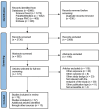Alcohol consumption and its association with cancer, cardiovascular, liver and brain diseases: a systematic review of Mendelian randomization studies
- PMID: 39574800
- PMCID: PMC11578756
- DOI: 10.3389/fepid.2024.1385064
Alcohol consumption and its association with cancer, cardiovascular, liver and brain diseases: a systematic review of Mendelian randomization studies
Abstract
Background: The health effects of alcohol consumption, particularly regarding potential protective benefits of light to moderate intake compared to abstinence, remain a subject of ongoing debate. However, epidemiological studies face limitations due to imprecise exposure measurements and the potential for bias through residual confounding and reverse causation. To address these limitations, we conducted a systematic review of Mendelian Randomization (MR) studies examining the causal relationship between alcohol consumption and cancers, cardiovascular, liver, and neurological diseases.
Methodology: We searched PubMed, ScienceDirect and Embase and Europe PMC up to 05/2024 for MR studies investigating the association of genetically predicted alcohol consumption with cancers, cardiovascular, liver and neurological diseases. We assessed methodological quality based on key elements of the MR design a genetic association studies tool.
Results: We included 70 MR studies that matched our inclusion criteria. Our review showed a significant association of alcohol consumption with multiple cancers such as oral and oropharyngeal, esophageal, colorectal cancers, hepatocellular carcinoma and cutaneous melanoma. While the available studies did not consistently confirm the adverse or protective effects of alcohol on other cancers, such as lung cancer, as suggested by observational studies. Additionally, MR studies confirmed a likely causal effect of alcohol on the risk of hypertension, atrial fibrillation, myocardial infraction and vessels disease. However, there was no evidence to support the protective effects of light to moderate alcohol consumption on cognitive function, Alzheimer's disease, and amyotrophic lateral sclerosis, as reported in observational studies while our review revealed an increased risk of epilepsy and multiple sclerosis. The available studies provided limited results on the link between alcohol consumption and liver disease.
Conclusions: Despite the valuable insights into the causal relationship between alcohol consumption and various health outcomes that MR studies provided, it is worth noting that the inconsistent ability of genetic instrumental variables to distinguish between abstainers, light and moderate drinkers makes it difficult to differentiate between U or J-shaped vs. linear relationships between exposure and outcome. Additional research is necessary to establish formal quality assessment tools for MR studies and to conduct more studies in diverse populations, including non-European ancestries.
Systematic review registration: www.crd.york.ac.uk/prospero/display_record.php?ID=CRD42021246154, Identifier: PROSPERO (CRD42021246154).
Keywords: alcohol use; conventional epigenetic studies; genetic epidemiological studies; health outcomes; level of alcohol use; single nucleotide polymorphisms.
© 2024 Bouajila, Domenighetti, Aubin and Naassila.
Conflict of interest statement
The authors declare that the research was conducted in the absence of any commercial or financial relationships that could be construed as a potential conflict of interest.
Figures
References
-
- Shield KD, Parry C, Rehm J. Chronic diseases and conditions related to alcohol use. Alcohol Res. (2013) 35:155–73. Available online at: http://www.ncbi.nlm.nih.gov/pubmed/24881324 - PMC - PubMed
-
- Wood AM, Kaptoge S, Butterworth AS, Willeit P, Warnakula S, Bolton T, et al. Risk thresholds for alcohol consumption: combined analysis of individual-participant data for 599,912 current drinkers in 83 prospective studies. Lancet. (2018) 391:1513–23. 10.1016/S0140-6736(18)30134-X - DOI - PMC - PubMed
-
- Ferrari AJ, Santomauro DF, Aali A, Abate YH, Abbafati C, Abbastabar H, et al. Global incidence, prevalence, years lived with disability (YLDs), disability-adjusted life-years (DALYs), and healthy life expectancy (HALE) for 371 diseases and injuries in 204 countries and territories and 811 subnational locations, 1990–2021: a systematic analysis for the global burden of disease study 2021. Lancet. (2024) 403:2133–61. 10.1016/S0140-6736(24)00757-8 - DOI - PMC - PubMed
Publication types
LinkOut - more resources
Full Text Sources



